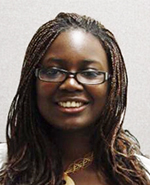
It was over sharing ideas at a dinner conversation with her advisor and a physical therapist from the Center for Bionic Medicine that led to Adenike Adewuyi’s PhD thesis project. A third-year Medical Scientist Training Program student, Adewuyi found the challenges that partial hand amputees face with prostheses fascinating.
“I also chose this project because it is clinically orientated and I get to interact with a diverse group of people including surgeons, engineers, orthotists, prosthetists and therapists. I also love that it merges my background in engineering and interests in anatomy,” she said.
Adewuyi develops algorithms to improve the control of artificial limbs. She conducts this research in the lab of Todd A. Kuiken, MD, PhD, professor in Physical Medicine and Rehabilitation, McCormick School of Engineering and Surgery. Unlike individuals with amputations in the arm or forearm, partial hand amputees have wrists, so her objective is to find a way that individuals can control the prosthesis and be able use different grasps in different wrist positions.
“If you used the pattern recognition control to open your hand and practice different grasps in one position it works well, but if I ask the person to open the hand in a different wrist position, they can’t do it,” she said. “That is because moving the wrist changes the length and shape of the muscles used and therefore changes the algorithm patterns. We don’t want the algorithms to get confused when the individual moves their wrist. We don’t want the prosthesis to think that a hand open is a hand closed.”
This winter, Adenike has been gathering data from able-bodied subjects to understand how wrist motion affects grasp patterns. Recently, she has started collecting data from partial hand amputees to decipher how to program the devices with the correct algorithms.
“When I met my first partial hand amputee patient, he was talking about the prosthesis he had and complained that when he moved his arms or wrists, the prosthesis didn’t work well,” she said. “I thought that was so interesting and if I could figure out a way for the prosthesis to work, it would directly impact someone’s way of life and it would be a remarkable improvement upon what is currently available.”






